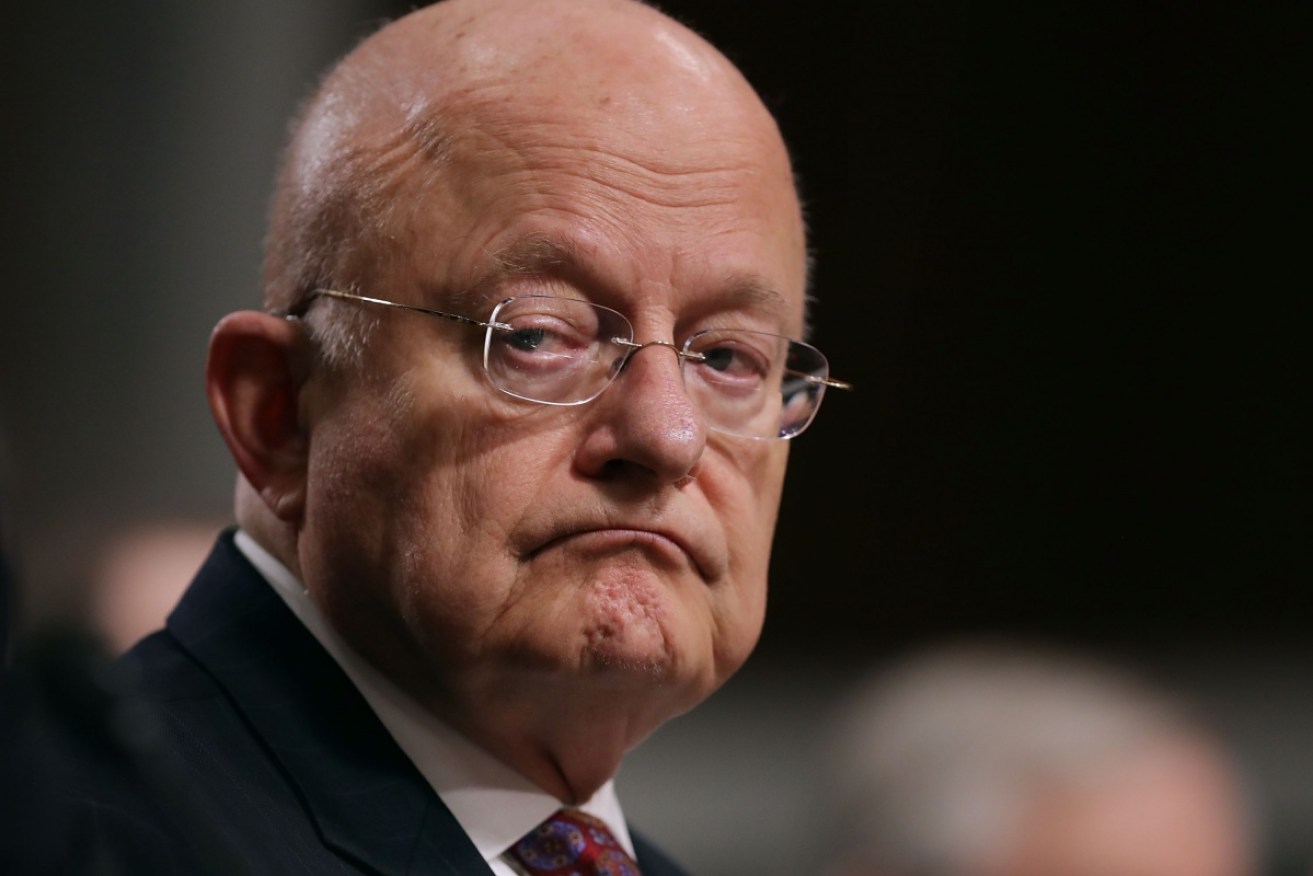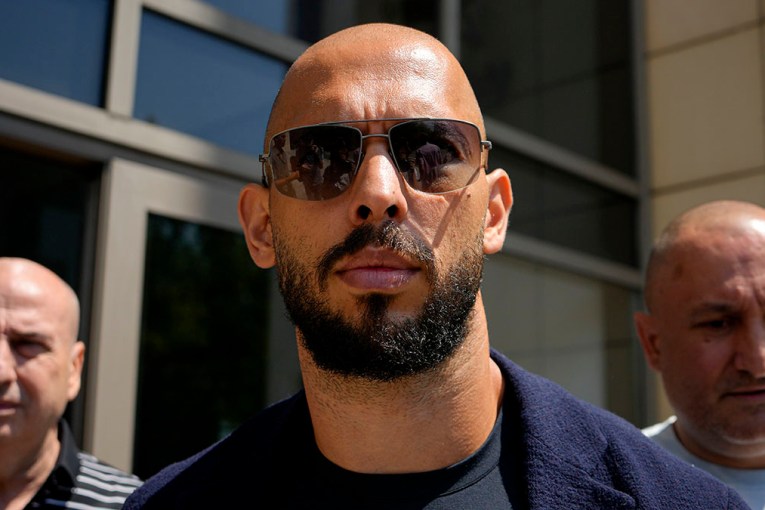Security chief ‘even more resolute’ on Russian hacking

Director of National Intelligence James Clapper testifying before the Senate Armed Services Committee. Photo: Chip Somodevilla/ Getty
The top US intelligence official has told Congress he was “even more resolute” in his belief that Russia staged cyber attacks on Democrats in the 2016 election campaign, despite skepticism from Republican President-elect Donald Trump about findings on Moscow’s role.
James Clapper, the director of National Intelligence, said on Thursday (US time) he had a very high level of confidence that Russia hacked Democratic Party institutions and operatives, as well as disseminating propaganda and fake news aimed at the November 8 election.
“Our assessment now is even more resolute than it was” on October 7 when the government first publicly accused Russia, Mr Clapper told a hearing of the Senate Armed Services Committee.
Although Mr Trump called himself a “big fan” of intelligence agencies, he is heading for a conflict over the issue because he has cast doubt on their assessments that Russia targeted the election. Many lawmakers from both parties are wary of Moscow and distrust Trump’s praise of Russian President Vladimir Putin and efforts to heal the rift between the United States and Russia.
Mr Trump will be briefed by intelligence agency chiefs on Friday on hacks that targeted the Democratic Party in the run-up to the election surprisingly won by the New York businessman.
“I don’t think we’ve ever encountered a more aggressive or direct campaign to interfere in our election process than we’ve seen in this case,” said Mr Clapper, who leaves when Mr Trump becomes president on January 20. Mr Clapper stopped short of declaring Russia’s actions “an act of war,” saying that determination was beyond the scope of his office.
Mr Clapper did not say what made him confident that Russia was behind the cyber attacks, but that conclusion is shared by US intelligence agencies such as the CIA and several private cyber security firms.
Moscow denies the hacking allegations. President Barack Obama last week ordered the expulsion of 35 Russian suspected spies and imposed sanctions on two Russian intelligence agencies he said were involved in hacking US political groups such as the Democratic National Committee (DNC).
In a tweet on Wednesday, Mr Trump cast doubt on a Russian role in the affair, writing: “(WikiLeaks founder) Julian Assange said ‘a 14 year old could have hacked Podesta’ — why was DNC so careless? Also said the Russians did not give him the info!”
However, on Thursday, Mr Trump said in another post on Twitter that he was not against intelligence agencies or in agreement with Mr Assange, whose organisation leaked Democrats’ emails.
Documents stolen from the DNC and candidate Hillary Clinton’s campaign chairman John Podesta were leaked to the media before the election, embarrassing the campaign.
US intelligence officials have said Russian cyber attacks were specifically aimed at helping Mr Trump beat Ms Clinton. Several Republicans have acknowledged the Russian hacking but have not linked it to an effort to help Mr Trump win.
Mr Clapper said there were multiple motives for the hacking but pointed out that “they did not change any vote tallies or anything of that sort.”
EARLIER
America’s top intelligence chief says he has not encountered a more aggressive hacking campaign than Russia’s hacking of the 2016 presidential election.
National Intelligence director James Clapper told Congress on Thursday that hacking was only one part of a multi–faceted campaign of disinformation and propaganda, including the placement of “fake news”, which continues today.
Committee chairman Senator John McCain opened the hearing with the statement that “every American should be alarmed by Russia’s attacks on our nation”.
“There is no national security interest more vital to the United States of America than the ability to hold free and fair elections without foreign interference.”

US intelligence chiefs testified to the Senate over cyber threats to the country from Russia. Photo: Chip Somodevilla/Getty
Mr Clapper told the committee that Russia poses an existential threat to the United States.
“I don’t think that we have ever encountered a more aggressive or direct campaign to interfere in our election process,” he told the Senate Armed Services Committee.
But he also expressed the view that Russian hacking efforts had not changed the result of the US election. He referred specifically to the question of whether voting machines could have been manipulated to affect the outcome.
Such a scenario has been posited as questions about Russian interference swirled in the wake of Hillary Clinton’s defeat in November.
While the intelligence community believes top Russian officials were behind cyberattacks aimed at Ms Clinton, President–elect Donald Trump has been dismissive of those claims.
Mr Trump’s backers also have seen the claims as an attack on the legitimacy of his election, but some Republicans have insisted that the matter must be thoroughly investigated.
In what was a direct shot aimed at Mr Trump, Mr Clapper said there was a difference between expressing “skepticism” of intelligence reports that Russia interfered with the American election and “disparagement” of the intelligence community.
Mr Clapper told the committee that when it comes to the the question of whether Russian hacking affected “the choices that the electorate made … there’s no way for us to gauge that.”
“Russia clearly has assumed an even more aggressive cyber posture,” he said.
Top intelligence officials also belittled WikiLeaks founder Julian Assange, saying his work has put American lives at risk.
Mr Clapper said he believed Assange was responsible for the publication of names which put lives in danger.
He did not elaborate.
WikiLeaks immediately responded on Twitter by accusing Mr Clapper of lying to Congress.
Just now: DNI James Clapper lies to Congress for 3rd time claiming Assange is 'indicted for a sex-crime'. He is not: https://t.co/Mb6gXlz7QS
— WikiLeaks (@wikileaks) January 5, 2017
Wikileaks has been under criminal investigation for its role in leaks of classified information.
At the committee hearing, Senator McCain asked Clapper whether Assange has any credibility.
Mr Clapper said “No,” and his assessment was seconded by Admiral Mike Rogers, director of the National Security Agency.
The US intelligence community is alarmed by the attitude of President–elect Donald Trump, who appears to be siding with Assange.
Mr Trump denied that, using Twitter as usual to get his message out.
The dishonest media likes saying that I am in Agreement with Julian Assange – wrong. I simply state what he states, it is for the people….
— Donald J. Trump (@realDonaldTrump) January 5, 2017
to make up their own minds as to the truth. The media lies to make it look like I am against "Intelligence" when in fact I am a big fan!
— Donald J. Trump (@realDonaldTrump) January 5, 2017
– with agencies








